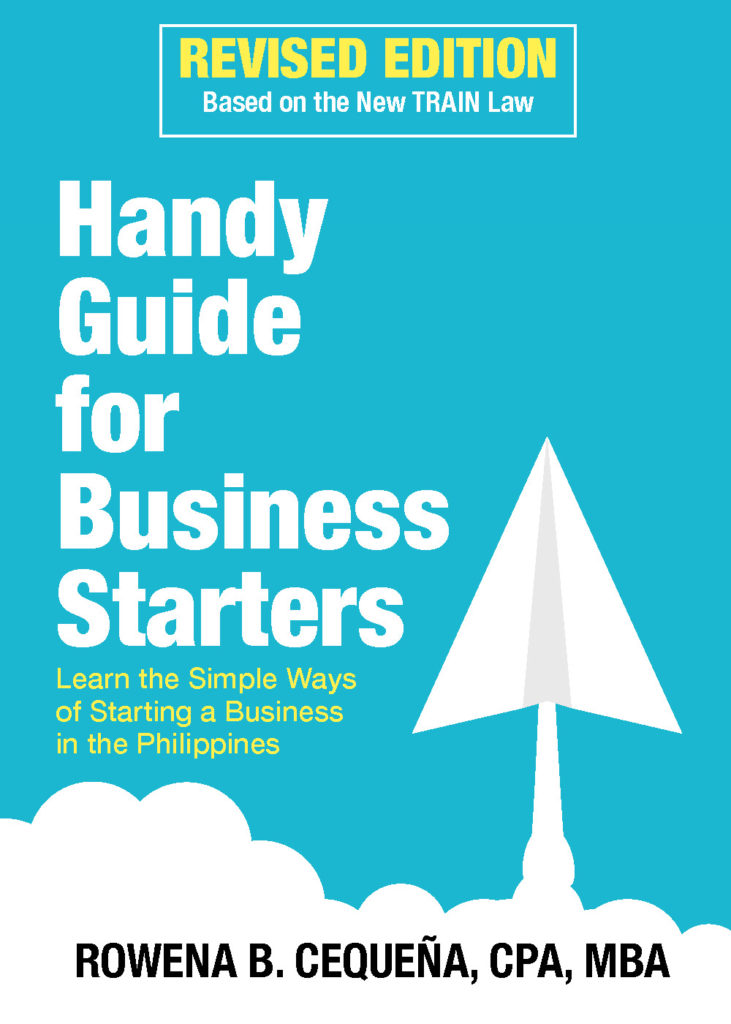By Rowena B. Cequeña
There are four types of business enterprises that you can choose from. These are: sole proprietorship, partnership, corporation, and cooperative. The basic features of each form of business are discussed in detail below:
1. Sole proprietorship
This kind of business is solely owned by an individual. This is the easiest to organize. In case of dissolution or bankruptcy, however, this kind of business is the most dangerous, since your creditor can run after all your personal properties should anything go wrong. Capital requirement depends on what kind of business you are going to pursue. It could either be capital intensive or no capital at all.
2. Partnership
This kind of business is owned by two or more partners. It could either be a professional or general partnership. Professional partnership involves the practice of one’s profession, like accountancy, law, or engineering. General partnership involves any kind of business. Limited partners are business partners with limited liability up to the extent of their investment in the company in case the company has to pay its creditors. In case of financial distress, they will not be required to add money to pay the
creditors unlike the general partners. The starting capital depends on the kind of business the partners will pursue.
3. Cooperative
This kind of business is owned by a minimum of 15 individuals. It can have as many members as possible, but each member’s investment may not exceed 10 percent of the total capital of the organization. Members vote for the officers of the cooperative. The provision of Republic Act 9520 and its implementing Rules and Regulations govern the cooperative acts. Registration is done with the Cooperative Development Authority.
4. Corporation
- Regular Corporation
Corporation, as defined in the Revised Corporation Code of the Philippines, is an artificial being created by operation of law, having the right of succession and the powers, attributes, and properties expressly authorized by law or incidental to its existence. It can be formed by two or more incorporators but not exceeding fifteen. It has a perpetual existence unless its articles of incorporation provides otherwise. There is no minimum capital stock, except as otherwise specifically provided by special law. In case of bankruptcy or financial distress, liability to creditors is limited to capital contributions, making the corporation the safest form of business.
- The One-Person Corporation
A one-person corporation, as defined in the Revised Corporation Code of the Philippines, is a corporation with a single stockholder. Only a natural person, trust, or an estate can form a one-person corporation. There is no minimum authorized capital stock required for a one-person corporation, except as otherwise provided by special law. It is not
even required to submit and file corporate by-laws. It must indicate the letters “OPC” either below or at the end of its corporate name. The single stockholder of a one-person corporation is the sole director and president of the corporation. Securities and Exchange Commission (SEC) Memorandum Circular No. 7, Series of 2019, which took effect on May 1, 2019, provides the term of existence of oneperson corporation as perpetual. If it is a trust or estate, its term shall be co-terminus with the existence of the trust or estate. Fifteen days after the issuance of the certificate of incorporation, a one-person corporation must appoint a treasurer, corporate secretary, and other officers necessary for the operation of the business. It must notify the SEC within five days after the appointment and run the business like a real corporation. The company’s funds should be separate from the owner’s personal funds. Liability to third parties and creditors are also limited to capital contributions.
*This excerpt is taken from Handy Guide Business Starters By Rowena B. Cequeña*
Grab your e-book and paperback version here.




